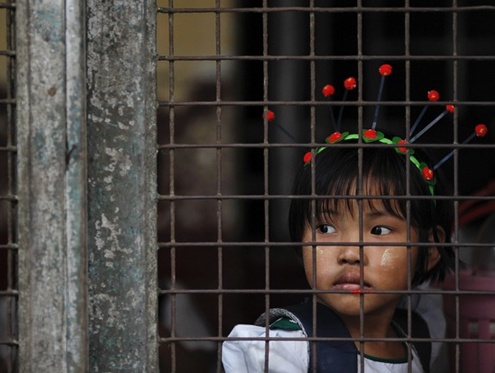After more than two years of politico-economic reforms in Burma, the country’s education sector remains in a state of serious ruin. Western countries, including the US and the UK, have pledged to assist with higher education reform in Burma, but if the the entire system is not restructured, the country’s schools will continue to stagnate.
No doubt the Western academics will be able to provide insight and recommendations that could help improve Burma’s education system. Nevertheless, the ex-generals who continue ruling the country must address the entrenched policies and curriculum established by the academics, faculty members and government officials who have all failed to initiate practical reforms that would benefit the country’s students.
At the tertiary and secondary levels, most teachers, lecturers, professors and virtually all professionals in the education sector have followed the dictates drawn up by the country’s successive military regimes.
Since Ne Win seized the reins of power after leading a coup in 1962, student activists have served as problematic adversaries to Burma’s ruling generals. On 7 July 2013, the country observed the 51st anniversary of the brutal crackdown at Rangoon University, where soldiers brutally gunned down students who were protesting against institution’s lackluster education standards and unfair university regulations. The next day, the campus’s historic student union building was dynamited as protestors took refuge inside.
In the following decades, educators lent a hand in reconnaissance work and aided in the suppression of student activists. Administrators expelled students and handed over pupils to the police. While there were exceptional teachers in the country, those with top jobs at the country’s universities often garnered their positions at the expense of anti-regime students.
“The generals were incredibly effective in wiping out higher education in an incredible fashion,” said Charles M Wiener from John Hopkins School of Medicine during an interview with the New York Times earlier this year.
[pullquote] “The entire educational system, from elementary to the university level, requires a revolutionary overhaul” [/pullquote]
But even under Thein Sein’s quasi-civilian rule, a new generation of students is still being oppressed. Students unions are still outlawed in Burma and student activists are under constant surveillance and subject to arbitrary arrest and questioning. More than a dozen student activists are still not allowed to resume their studies after being released from prison last year. Unfair and discriminatory regulations effectively prevent university students who miss more than two years consecutively from re-enrolling in full-time programmes.
In 21st century Burma, children are still subject to corporal punishment in schools, such as caning and other harsh means of punishment, while being taught to copy and repeat their teacher’s instructions rather than engaging in critical thinking exercises. The sector is also rife with corruption due to insufficient funding from the government. In March, the parliament allocated around 20 percent of Burma’s national budget to the military, while the country’s schools received 4.4 percent.
As long as those in power continue to see students as enemies and only promote their hardline supporters, Burma’s schools will fail to provide students with the necessary skills to compete in the global economy at the country’s expense. The entire education system, from elementary to the university level, requires a revolutionary overhaul of its infrastructure and curriculum to succeed.
It is now time to demand that the ex-generals and their loyal academics institute real reforms and begin providing the country’s future leaders and workforce with the education that will allow the country to overcome decades of underachievement.
Zaw Nay Aung is the director of Burma Independence Advocates
-The opinions and views expressed in this piece are the author’s own and do not necessarily reflect DVB’s editorial policy.



